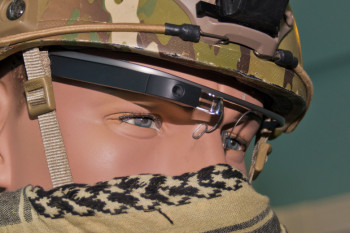
Google Glass: saving lives on and off the battlefield
While us everyday consumers are chomping at the bit for a chance to buy Google Glass whenever it launches, some firms are already putting it to good use for needs far beyond most of our comprehension. We’ve already heard of Google Glass being used in the medical field to be a handy little assistant during typical procedures, and now it’s being taken a step further.
For starters, it looks like the little smart glasses that could will be getting some field experience, with the United States Air Force currently testing the units with their BATMAN research team. No, they’re not in charge of staying up to date on all things Batman (though that would be a incredibly cool job).
It stands for Battlefield Air Targeting Man-Aided (K)nowledge, and they’re tasked with helping move field tools forward for the pilots risking their lives day in and day out for our safety. So what do they see in Google Glass? They laud it for “its low power, its low footprint,” and the fact that “it sits totally above the eyes, and doesn’t block images or hinder vision.”
Google says they don’t have any involvement in BATMAN’s research. In fact, they say they have pretty much zero working relationship with the Air Force, and have no plans on changing that. Their explanation is that the Google Glass Explorer program is being put to use exactly the way it was meant to, allowing anyone and everyone to experiment with this emerging technology to see how it can enhance all parts of life.
But the Air Force aren’t the only ones looking into ways to see how this could help save lives. Dr. Steven Horng of Beth Israel Deaconess Medical Center in Boston tells of a story where he was able to help stabilize a patient during trauma.
The patient’s brain was bleeding, but the doctor couldn’t recall the man’s exact history of allergic reactions to determine which drug to use to get it under control. He had the info on his chart, but the chart wasn’t in the room. He opted to check the patient’s history on his Google Glass unit instead of leaving the patient or asking the nurse to run off and look for it.
Rather than having to excuse myself, it means I can quickly access that information without having to interrupt the patient, lose eye contact, or even leave the room.
Of course, stock configurations of Google Glass aren’t suitable for hospitals and military bases. Security is always a concern for these types of things, but the openness of the platform allows these folks to load up versions of Android more suitable to their causes.
Unfortunately, this means the doctors and pilots wouldn’t be able to take a unit home to use at their leisure, but we imagine making their jobs easier and safer is more important than giving them a way to Google information about the books they’re reading and TV shows they’re watching at night (and they could just go buy one for personal use if they wanted).
Most exciting is that all of this stuff is happening before Google Glass has even had a chance to fully mature. That the device is currently charting shaky ground in the court of law on various fronts is enough to know just how new this all really is.
It can only get better from here on out, though, as more and more people explore what this thing can do to help enhance our lives. From sports and medicine to combat and education, things can only get more interesting as Google dials in a product ready for store shelves.
[via VentureBeat, The Boston Globe]